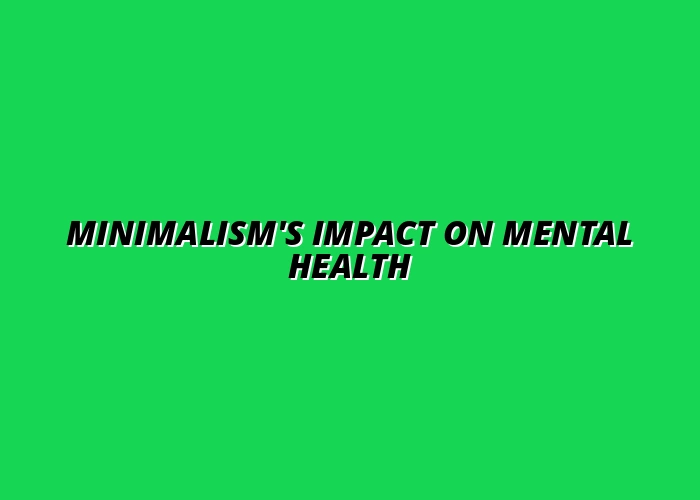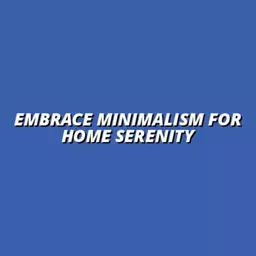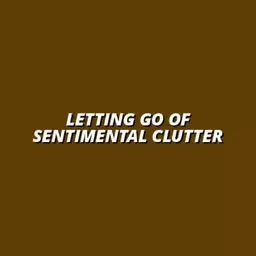Stress Reduction
Decluttering reduces cortisol levels, promoting a calmer state of mind.
Subscribe to receive practical tips and inspiring stories that empower you to create a serene and organized life.
Posted on: 2025-07-22
By: Clara Bennett
Have you ever felt that overwhelming sense of chaos in your life, surrounded by too many possessions and distractions? Adopting a minimalist lifestyle can be the transformative solution you’ve been searching for, not just for your space but for your mental well-being.
Embracing minimalism offers several positive effects on our mental health, as highlighted below:
Decluttering reduces cortisol levels, promoting a calmer state of mind.
Minimalism encourages joy, mindfulness, and appreciation for what truly matters.
Reducing distractions leads to clearer and more efficient decision-making.
By focusing less on material possessions, deeper emotional connections are fostered.
Adopting minimalism can reduce consumption and stress related to financial burdens.
Minimalism is more than just a trend; it's a lifestyle choice that many people are embracing today. At its core, minimalism is about simplifying one's life by reducing excess material possessions and focusing on what truly matters. This shift not only leads to a tidy space but also nurtures our mental health. In our fast-paced world, clutter can cause chaos, leading to stress and anxiety. Adopting a minimalist approach encourages us to prioritize clarity and peace, creating a serene environment where we can thrive. For more insights on simplifying your home, you might find our effective steps to declutter your home helpful.
Research shows that there’s a strong link between our belongings and our mental state. Too many possessions can overwhelm us and distract us from what really counts—our relationships, experiences, and personal well-being. When we choose to declutter, we open up space in both our homes and minds. It's like taking a deep breath after holding it in for too long! By letting go of unnecessary items, we can focus on our mental health, reducing stress and fostering a sense of calm.
So, why should we care about minimalism when it comes to mental health? The answer lies in its ability to declutter not just our physical spaces but our emotional states as well. When we embrace minimalism, we begin to notice the positive effects on our mental health. Here are some key aspects of this relationship:
Understanding this connection is crucial for anyone looking to improve their mental well-being. By recognizing how our surroundings influence our thoughts and feelings, we can make intentional choices that support our mental health journey. It’s a powerful reminder that we have the ability to shape our lives, one decluttered space at a time.
Scientific studies have shown that decluttering can significantly lower our cortisol levels, which is a hormone associated with stress. When we take the time to clean up our spaces, it can feel like a weight has lifted off our shoulders. Imagine walking into a serene room that brings you peace instead of anxiety. This shift can be transformational!
Here are some benefits that come from decluttering:
As someone who has experienced the transformative power of minimalism through Clean Simple Lifestyle, I can attest to how freeing it feels. The act of decluttering is not just about physical spaces; it’s about creating mental clarity and emotional balance. You can also explore minimalist rubbish removal tips to further simplify your environment.
Minimalism encourages us to cultivate positive emotions and mindful living. By focusing on what truly matters to us, we foster a deeper connection to ourselves and our surroundings. When we let go of excess, we create space for joy and gratitude to flourish.
Some of the key emotional benefits include:
By embracing minimalism, we learn to focus on our emotional well-being, allowing us to bounce back from challenges more effectively. It’s a journey that leads to self-discovery and enhanced resilience, paving the way for a mentally healthier life. For a comprehensive guide, check out our beginner's guide to minimalist living.
Did you know? Implementing the "20/20 rule" can greatly assist you in your decluttering journey. If an item can be replaced for under $20 and you can buy it within 20 minutes from your home, consider letting it go. This mindset helps reduce the emotional attachment to items that may no longer serve a purpose in your life!
As we’ve explored throughout this article, embracing a minimalist lifestyle can significantly enhance your mental health and overall well-being. From reducing stress and anxiety to fostering emotional resilience, the benefits of minimalism are profound. It’s about creating a serene environment that allows clarity of mind and emotional balance, making it easier to navigate life's challenges.
To recap, here are some key benefits of minimalism we discussed:
Are you feeling overwhelmed by your surroundings or the complexities of life? It might be time to consider how minimalism can serve as a guiding light toward better mental health. At Clean Simple Lifestyle, we believe that taking small steps toward simplicity can create a ripple effect in your emotional well-being. Imagine the peace that comes from surrounding yourself only with items that bring joy and purpose!
Ask yourself: what would your life look like with less clutter and more meaning? By integrating minimalism into your daily routine, you can cultivate an atmosphere that nurtures mindfulness and joy. Remember, the journey toward a minimalist lifestyle is unique to each person, and it’s all about finding a balance that aligns with your personal needs.
Are you ready to take the first step toward a more peaceful and fulfilling life? I invite you to start your minimalist journey today! Here are some actionable steps to help you get started:
Remember, Clean Simple Lifestyle is here to support you every step of the way! Let’s embrace the beauty of simplicity together and create a life filled with clarity and joy. You can find more organizing tips to enhance your home and mental well-being on our site, such as stress-free home decluttering techniques. Start today, and don’t hesitate to reach out for more tips or resources!
Here is a quick recap of the important points discussed in the article:

 Have you ever walked into a clutter-free space and felt an instant sense of calm? Minimalism isn't j
Have you ever walked into a clutter-free space and felt an instant sense of calm? Minimalism isn't j
 As we navigate through life, our belongings often become vessels of cherished memories and emotional
As we navigate through life, our belongings often become vessels of cherished memories and emotional
 What if you could transform the chaotic holiday season into a time of peace and meaningful connectio
What if you could transform the chaotic holiday season into a time of peace and meaningful connectio